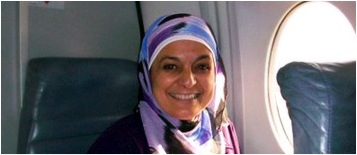“I have the sincere belief that if people get to know each other, one on one, that they’ll stop being afraid of each other, and we’ll be able to get rid of all this hate in the world,” said Rose Hamid, the 56-year-old Muslim flight attendant who stood up in silence during Donald Trump’s campaign rally last week – and was ejected.
 The incident occurred at a Trump rally in Rock Hill, South Carolina, attended by more than 2,000 of his supporters. Wearing a white head scarf and a turquoise shirt that read “Salam, I come in peace”, she was reported to have said in advance, “I figured that most Trump supporters probably never met a Muslim so I figured that I’d give them the opportunity to meet one.”
The incident occurred at a Trump rally in Rock Hill, South Carolina, attended by more than 2,000 of his supporters. Wearing a white head scarf and a turquoise shirt that read “Salam, I come in peace”, she was reported to have said in advance, “I figured that most Trump supporters probably never met a Muslim so I figured that I’d give them the opportunity to meet one.”
She stood up in the the stands directly behind Trump when he said that refugees fleeing the war in Syria were affiliated with so-called Islamic State. It was at that point that police evicted her.
What made the incident remarkable was not what happened in the rally, however. Many protesters have been refused entry or removed from Trump events. What was astonishing in this instance — in the midst of a campaign marked by ever-rising levels of hostility — was her extraordinary response to reporters immediately afterwards.
“My goal was to let people see that Muslims are not that scary,” she said. “The people around me were lovely. They were sharing their popcorn. But what happened when the crowd got this hateful crowd mentality, was a vivid example of what happens when you start using hateful rhetoric and how it can incite a crowd. Moments before they were very kind to me. Actually one woman reached over, took my hand, and said, ‘I’m so sorry this is happening to you.’”
Asked by a CNN reporter why she went to the Trump rally where she would be, in his words, “around those people”, she said she attended, “Because I don’t want to think of them as ‘those people’. I think that’s what the problem is. We look at people and we categorize them as ‘those people who are bad people’ and ‘these people are the good people’. I believe people in all camps are decent people when you get to know them. That was evidenced by the people around me, who were very lovely people. But when you get that hateful rhetoric going, it incites people.”
In the live CNN interview, the reporter asks her to confirm that she was asked by a member of the crowd if she had a bomb.
Without a hint of indignation or fear, Rose giggles and says she told the man, “No, do you have a bomb?’” She told the reporter, “One guy said ‘Isa loves you,’ which is the Arabic word for Jesus. ‘Yeah, I know,’ I said, ‘and Jesus loves you too!’”
In 2009, Rose was interviewed by the online travel magazine WorldHum because she wears her hijab while working as a flight attendant on US Airways. She was asked how the 9/11 attack on the World Trade Center affected her:
The day after 9/11, I had to go to a store and was very scared about how people would treat me. There was a guy working there collecting the shopping carts. As I walked by him, he looked at me and said, “Hey, how are you doing?” just like he did to every other person. That changed my world. That simple thing, him saying hello.
So did the offers of help. There were people from the local Jewish and Christian communities who wrote to the Muslim community and said that if we needed someone to come to Friday prayers to stand as guards, or if Muslim women felt scared about going out in public with their headscarves, that they would run errands for them or accompany them.
That concept of standing with someone, and knowing someone is standing with you, is extremely empowering. I try to stand with others, too. I find myself constantly defending the Jewish faith to Palestinians who view Jews only as the oppressors.
There’s a saying of the Prophet that the person who gives salutations first is the most blessed. If every person was competing to be the first one to say hello, if that was the way we lived our lives, that would really change the world.
Last week in South Carolina, seven years on from 9/11, having just been evicted from the Trump rally, her faith is unchanged. Remarkably, she told CNN: “The thing is that people don’t even know what they’re saying. They just get riled up by the hate-mongering. So basically I feel sorry for them.”
As the story of what happened to her at the rally cascades around the world, let’s hope her transformative message of peace gets heard, as she would wish, rising above the hate-mongering.
10 January 2016
